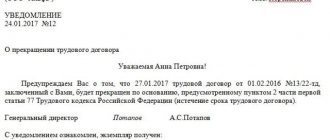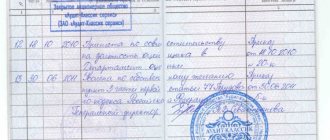About leave and deductions
According to the rules of the Labor Code of the Russian Federation, the right to leave for the first year of work arises for an employee after 6 months of continuous work.
By agreement of the parties, the employee may be granted paid leave before the expiration of this period. The employer is obliged to provide certain categories of employees with leave upon application before the expiration of the specified period. For example, for women before or immediately after maternity leave. Leave for the second and subsequent years of work can be granted at any time of the working year in accordance with the order of provision of annual paid leave established by a given employer.
The working year is 12 months and, unlike the calendar year, is calculated not from January 1, but from the day the employee starts working for a specific employer (Letters of the Ministry of Labor of Russia dated October 25, 2018 N 14-2 / OOG-8519, Rostrud dated June 14, 2012 N 853-6-1). For example, if an employee joined you on December 15, 2019, the working year will be from December 15, 2019 to December 14, 2020.
By the way, the Ministry of Labor gave clarifications that vacation should not begin earlier than the working year for which it is granted. In this case, the end of the vacation may occur in the next working year (Letter of the Ministry of Labor of Russia dated October 25, 2018 N 14-2 / OOG-8519).
The same approach is supported in judicial practice (Definitions of the Nizhny Novgorod Regional Court dated August 17, 2010 in case No. 33-7171, St. Petersburg City Court No. 33-16777/2012, Appeal determination of the St. Petersburg City Court dated May 25, 2017 No. 33-10206 /2017 in case No. 2-17215/2016).
This means that if an employee got a job with you on 12/01/2018 and as of 11/30/2019 (working year from 12/01/2018 to 11/30/2019) took all 28 calendar days off (as a general rule), the next vacation can be granted to him no earlier than December 1, 2021. The order of granting vacations is planned annually by the employer. No later than 2 weeks before the start of the calendar year, the vacation schedule is approved. At the same time, certain categories of employees have the right to go on vacation upon application, without taking into account the schedule. For example, such leave is provided to employees who have three or more children under the age of 12 (Article 262.2 of the Labor Code of the Russian Federation).
When planning vacations, you must keep in mind that it can be divided into parts, but at least one part must be at least 14 calendar days (Article 125 of the Labor Code of the Russian Federation). Moreover, 14 calendar days are provided specifically for the working year, and not the calendar year (Letter of the Ministry of Labor of Russia dated September 24, 2019 N 14-2 / OOG-6958). This means that if an employee has vacations that have not been taken off, 14 days for the current working year must be counted without taking into account these vacations. Vacations not taken can be added to this vacation or provided at another time. By the way, Rostrud discourages excessively splitting vacations, otherwise the employee will not be able to take advantage of the vacation to restore his ability to work.
So, vacation cannot be granted before the beginning of the working year, but can be used before its end. Moreover, the law does not establish norms allowing the employer to provide vacation in the working year, taking into account the days worked. Accordingly, unworked days may arise if the employee quits before the end of the working year for which the leave was granted.
Deductions from an employee’s salary are made only in cases provided for by the Labor Code of the Russian Federation and other federal laws.
In accordance with paragraph 5, part 2, article 137 of the Labor Code of the Russian Federation, if an employee is dismissed before the end of the working year for which he has already received annual paid leave, deductions can be made from his salary for unworked vacation days.
But there are a number of restrictions.
Firstly , there are restrictions on individual grounds for dismissal . For example, deduction cannot be made if an employee leaves due to the liquidation of an organization or a reduction in the number or staff of employees.
Secondly , the amount of all deductions made by decision of the employer cannot exceed 20% of the payment remaining after deduction of personal income tax (Part 1 of Article 138 of the Labor Code of the Russian Federation, Letter of the Ministry of Labor of Russia dated October 22, 2018 N 14-1 / OOG-8142, Ministry of Health and Social Development of Russia dated November 16, 2011 N 22-2-4852). If the amounts paid are not enough for deductions, it is impossible to recover from the employee the amount of unearned vacation pay (part 4 of article 137 of the Labor Code of the Russian Federation, paragraph 3 of article 1109 of the Civil Code of the Russian Federation, paragraph 5 of the Review of judicial practice of the Supreme Court of the Russian Federation for the third quarter of 2013, Determination of the Supreme Court of the Russian Federation dated September 12, 2014 N 74-KG14-3, Letter of the Ministry of Labor of Russia dated October 23, 2018 N 14-1/OOG-8448). So it is useless to go to court for recovery (Decision of the Supreme Court of the Russian Federation dated October 25, 2013 N 69-KG13-6, Determination of the Moscow City Court dated 08/08/2011 in case No. 33-23166).
In addition, if the employee has a writ of execution, deductions for unearned vacation can be made only after deductions for all writs of execution, since writs of execution have priority over deductions by the decision of the employer (Part 2 of Article 99 of Federal Law of October 2, 2007 N 229 -FZ “On Enforcement Proceedings”). Moreover, the increased limits (50% and 70%) apply only to deductions under executive documents (parts 2, 3 of Article 138 of the Labor Code of the Russian Federation, parts 2, 3 of Article 99 of the Federal Law of October 2, 2007 N 229-FZ ). It is impossible to sum up the established limits (Letter of Rostrud dated May 30, 2012 N PG/3890-6-1).
Thirdly , it should be remembered that deductions can not be made from all amounts, but only from payments due to the employee upon dismissal (Letter of the Ministry of Labor of Russia dated October 22, 2018 N 14-1/OOG-8142, Ruling of the Supreme Court of the Russian Federation dated 05.02 .2018 N 59-KG17-19). This means that if an employee, for example, was ill before dismissal, it is impossible to withhold overpaid vacation pay from temporary disability benefits (see, for example, the Appeal Determination of the Samara Regional Court dated June 4, 2012 N 33-5116/2012). In addition, it is impossible to make deductions from payments that are not subject to foreclosure in accordance with federal law (Part 4 of Article 138 of the Labor Code of the Russian Federation). This is, for example, reimbursement of travel expenses according to the advance report, compensation for the use of the employee’s personal property (clauses “a”, “b”, paragraph 8, part 1, article 101 of the Federal Law of October 2, 2007 N 229-FZ “On Enforcement Proceedings” ").
In all cases when you are subject to a deduction limitation, you can agree with the employee on a voluntary return of the amount.
For example, he can write an application for deduction from salary (or other payments).
Then we will not be talking about retention in the sense of Art. 137 and 138 of the Labor Code of the Russian Federation, but about the employee’s will to dispose of his wages, as indicated by Rostrud, for example, in Letter dated 10/07/2019 N PG/25778-6-1 (for the meaning, see also Letters of Rostrud dated 09/26/2012 N PG /7156-6-1, dated September 16, 2012 N PR/7156-6-1). In addition, the employee can repay the debt in cash to the organization's cash desk. By the way, according to the meaning of the explanations presented in the Letter of the Federal Social Insurance Fund of the Russian Federation dated August 20, 2007 N 02-13/07-7922, deductions at the will of the employee can also be made from temporary disability benefits (the letter discussed overpaid benefits). Withholding for unworked vacation days is a right, not an obligation, of the employer and is at his discretion (Letter of the Ministry of Labor of Russia dated October 22, 2018 N 14-1/OOG-8142). So the employer can refuse deductions.
If, taking into account all the rules and restrictions, the organization has enough payments to deduct for unworked vacation days, such deduction should be issued by order of the manager (since the deduction is made by decision of the employer). Considering that there is no established form for such an order, it is drawn up in any form.
Article 295. Paid holidays for employees engaged in seasonal work
Commentary on Article 295
1. Employees employed in seasonal work have the right to paid leave or monetary compensation upon dismissal.
The amount of compensation is set at the rate of 2 working days for each month of work.
This provision allows us to say that the rules of Art. 115 of the Labor Code, which establishes the duration of vacation for all employees at 28 calendar days, does not apply to seasonal workers. This conclusion can be made by simple arithmetic. An employee who has worked in an organization for 6 months will receive compensation for 14 calendar days of vacation upon dismissal. At the same time, an employee who has worked for a full season - 6 months - receives only 12 working days. If the season is determined to be longer than 6 months, the stated difference will increase.
It should be noted that, when making such a decision, the legislator was guided by clause 29 of the Rules on regular and additional leaves, approved. NKT of the USSR on April 30, 1930, according to which, when calculating compensation for unused vacation in the event that the employee did not work in the organization for a full calendar year, 2 working days of paid vacation were due for the month worked.
Currently, the Supreme Court of the Russian Federation has recognized these provisions as consistent with the Labor Code of the Russian Federation.
Considering on December 1, 2004 the case on T.’s application to recognize clause 29 of the Rules on regular and additional leaves as invalid and not subject to application, approved. CNT of the USSR On April 30, 1930, the Supreme Court of the Russian Federation indicated that there was no reason to believe that this clause contradicts the Constitution of the Russian Federation or the Labor Code.
The named normative legal act is not included in the list of individual legislative acts that have lost force, set out in Art. 422 of the Labor Code, and according to Art. 423 of the Labor Code, legislative acts of the former USSR, operating on the territory of the Russian Federation within the limits and in the manner provided for by the Constitution of the Russian Federation, Resolution of the Supreme Council of the RSFSR of December 12, 1991 N 2014-1 “On the ratification of the Agreement on the creation of the Commonwealth of Independent States”, apply, since they do not contradict the Labor Code.
In accordance with Art. 127 of the Labor Code, upon dismissal, the employee is paid monetary compensation for all unused vacations.
Cash compensation for unused vacation is provided for in Art. 291 of the Labor Code for employees who have entered into an employment contract for a period of up to 2 months, which is paid upon dismissal at the rate of 2 working days per month of work.
For other categories of employees, the Labor Code does not provide for a mechanism for calculating compensation for unused vacation.
The applicant groundlessly refers to the presence of contradictions in the contested part of the normative act of Art. Art. 3, 114 and 127 TK.
Yes, Art. 3 of the Labor Code prohibits discrimination in the sphere of labor, which includes restrictions in labor rights and freedoms or obtaining advantages depending on gender, race, skin color, nationality, language, origin, property, social and official status, age, place of residence, attitude towards religion, political beliefs, membership or non-membership in public associations, as well as other circumstances not related to the employee’s business qualities.
It does not follow from the contested provisions of the normative legal act that it is aimed at discriminating against workers in the world of work.
In accordance with Art. 114 of the Labor Code, employees are granted annual leave while maintaining their place of work (position) and average earnings.
This provision of the Labor Code also does not determine the procedure for calculating compensation for unused vacation, and therefore the part of the normative legal act challenged by the applicant does not contradict it.
The norms of the Constitution of the Russian Federation cited by T. provide the right to work, including the right to rest and annual paid leave (Article 37), a ban on restriction of rights, which is possible only by federal law in these cases (Article 55) in order to protect the foundations of the constitutional order, morality, health, rights and legitimate interests of other persons, ensuring the defense of the country and state security, are also not violated by the contested part of the normative act.
Taking into account the above, the Supreme Court of the Russian Federation declared T.’s application invalid and not subject to application of clause 29 of the Rules on regular and additional leaves, approved. The CNT of the USSR on April 30, 1930, left without satisfaction.
By decision of February 15, 2005 N KAS05-14, this decision was left unchanged.
2. The legislation does not contain a ban on granting extended vacations to seasonal workers in cases where this is directly provided for by law (see Article 115 and commentary thereto).
3. As a rule, seasonal workers do not use vacation in kind.
Comments to the Labor Code of the Russian Federation
Edited by Orlovsky Yu. P. 2007 Source: SPS Consultant
Income tax
Vacation pay is included in labor costs in the amount of accrued amounts (clause 7 of Article 255 of the Tax Code of the Russian Federation).
When recalculating vacation pay and deducting it from salary (or voluntary return), there is no need to make adjustments to the previously calculated tax base, since the accrual of vacation pay in the original amount was not erroneous. From the explanations of the Ministry of Finance it follows that when withholding unearned vacation pay, the corresponding amounts previously included in expenses should be taken into account as part of non-operating income by analogy with the return (restoration) of costs that were previously included in expenses (for example, restored reserves) (Article 250 Tax Code of the Russian Federation, Letter of the Ministry of Finance of the Russian Federation dated December 3, 2009 N 03-03-05/224). A similar opinion is presented in the Letter of the Federal Tax Service of the Russian Federation for Moscow dated January 11, 2007 N 21-08/ [email protected] The inclusion of withheld (returned) amounts in non-operating income is justified by the fact that such receipts are not related to the sale of goods (works, services) ) (and therefore do not relate to sales income under Article 249 of the Tax Code of the Russian Federation), while the list of non-operating income is open. In turn, there are no grounds for adjusting expenses in the form of previously paid vacation pay, since payments were made in accordance with the labor legislation of the Russian Federation.
The Federal Tax Service of Russia in Moscow explains the situation when the employer does not withhold the amount of advance vacation pay as follows: “the expenses of the employing organization incurred in connection with the dismissal of an employee who did not work the days of the granted vacation are not taken into account when forming taxable profit due to their non-compliance with the provisions Art. 252 of the Tax Code of the Russian Federation" (Letter dated June 30, 2008 N 20-12/061148). The Letter of the Federal Tax Service of Russia for Moscow dated April 17, 2006 N 21-07/ [email protected] clarifies that this is a situation where the employer had the opportunity to withhold the amount from the dismissed employee in accordance with the Labor Code of the Russian Federation, but did not do so.
Thus, according to the logic of the tax authorities, if the employer himself refuses to make deductions, the amount of vacation pay regarding unworked days cannot be included in expenses. However, it is not explained how to adjust the income tax base.
Considering that vacation pay was initially paid and included in expenses in the correct amount, there is no reason to make adjustments to the initial reporting.
In this regard, previously recognized expenses can be adjusted by increasing non-operating income in the current period by the amount that the employer refuses to withhold. At the same time, the organization has no reason to exclude from expenses insurance premiums accrued on vacation pay for unworked days not returned by the employee. After all, Article 270 of the Tax Code of the Russian Federation does not contain a prohibition on accounting for expenses of insurance premiums accrued for payments and remunerations that are not recognized as expenses for the purposes of Chapter. 25 of the Tax Code of the Russian Federation (Letters of the Ministry of Finance of Russia dated October 21, 2016 N 03-03-06/1/61454, dated June 9, 2014 N 03-03-06/1/27634, dated July 15, 2013 N 03-03-06/1/ 27562).
At the same time, there is an approach that the employer is not obliged to increase the tax base for income tax in the current period by the amount of unearned vacation pay, which he refused to withhold, since from the point of view of labor legislation the employee does not have any debt.
The employer only has the right (but not the obligation) to make a deduction.
Refusal of such deductions does not create a debt for the employee and can be an element of the organization’s personnel policy, focused on the interests of employees and raising the positive image of the company to attract and retain the best human resources. Moreover, due to the principle of freedom of economic activity, the taxpayer carries out it independently at his own risk and has the right to independently and individually assess its effectiveness and expediency. The validity of expenses taken into account when calculating the tax base must be assessed taking into account the circumstances indicating the taxpayer’s intentions to obtain an economic effect as a result of real business or other economic activity (Definitions of the Constitutional Court of the Russian Federation dated December 16, 2008 N 1072-О-О, dated June 4, 2007 N 366-O-P, dated 06/04/2007 N 320-O-P, Resolution of the Plenum of the Supreme Arbitration Court of the Russian Federation dated 10/12/2006 N 53). If the employer was unable to withhold the amount of advance vacation pay due to the above restrictions on withholding (established by labor legislation), nothing needs to be adjusted, since the employer does not have the right to collect this amount. In this case, in our opinion, there should be no risks in terms of income tax.
Personal income tax
The amounts of paid vacation pay are employee income subject to personal income tax (clause 6, clause 1, article 208, clause 1, article 210 of the Tax Code of the Russian Federation). Personal income tax is calculated on the date of actual receipt of income, determined in accordance with Art. 223 of the Tax Code of the Russian Federation (clause 3 of Article 226 of the Tax Code of the Russian Federation). In relation to vacation pay, such a date is the day of payment of income (transfer to the employee’s card or issuance in cash through the cash register) (clause 1, clause 1, article 223 of the Tax Code of the Russian Federation, Letter of the Ministry of Finance of Russia dated March 28, 2018 N 03-04-06/19804, Letter Federal Tax Service of Russia dated 06/13/2012 N ED-4-3/ [email protected] together with Letter of the Ministry of Finance of Russia dated 06/06/2012 N 03-04-08/8-139).
Personal income tax is withheld directly from the taxpayer’s income when it is actually paid to the employee (clause 4 of article 226 of the Tax Code of the Russian Federation). Personal income tax on vacation pay is transferred no later than the last day of the month in which such payments were made (clause 6 of Article 226 of the Tax Code of the Russian Federation). If any deductions are made from the taxpayer’s income by order, by decision of a court or other authorities, such deductions do not reduce the tax base (paragraph 2, clause 1, article 210 of the Tax Code of the Russian Federation).
According to the explanations of the Ministry of Finance, if an employee returns to the employer the amounts of vacation pay actually paid to him earlier, such amounts will not be recognized as his income.
Personal income tax amounts withheld and transferred to the budget from the specified vacation leave are overpaid by the tax agent. Accordingly, the amount of the employee’s personal income tax obligations for the tax period must be adjusted. At the same time, the tax agent - employer has an overpayment of personal income tax, which can be returned to him within the framework of Article 78 of the Tax Code of the Russian Federation (Letter dated October 30, 2015 N 03-04-07/62635 (sent by Letter of the Federal Tax Service of Russia dated November 11, 2015 N BS- 4-11/ [email protected] )).
The Federal Tax Service, in turn, explains that in the case when an organization (tax agent) recalculates the amount of vacation pay and, accordingly, the amount of personal income tax, then in section 1 of the calculation in Form 6-NDFL the total amounts are reflected taking into account the recalculation made (Letter of the Federal Tax Service of Russia dated 05/24/2016 N BS-4-11/9248). The Letter of the Federal Tax Service of Russia for Moscow dated March 12, 2018 N 20-15/049940 clarifies that the total amounts, taking into account the recalculation made, are reflected in Section 1 of the updated calculation in Form 6-NDFL for the period in which vacation pay was accrued. Thus, if by the time of recalculation of vacation pay you have already submitted Form 6-NDFL, it must be adjusted by entering the amount of vacation pay, taking into account the withholding (refund) of tax.
Certificates in form 2-NDFL also need to be adjusted if you have already submitted them by the time of recalculation. If not, the final data must be generated taking into account recalculation.
The specified approach is presented in paragraph 1 of the Letter of the Federal Tax Service of Russia dated October 11, 2017 N GD-4-11/20479.
If the employer does not withhold vacation pay for unworked days (of his own free will or due to legal restrictions), no adjustments need to be made to personal income tax reporting. After all, personal income tax has already been withheld from the employee’s income, while vacation pay remains vacation pay (payments are not reclassified). The employee does not receive additional income. On this issue, see Letters of the Ministry of Finance of Russia dated December 26, 2017 N 03-04-06/86736 and the Federal Tax Service of Russia for Moscow dated June 28, 2018 N 20-15/138129.
Insurance premiums
The employer calculates insurance premiums in the general manner from the amount of vacation pay (clause 1 of Article 420 of the Tax Code of the Russian Federation).
The base for insurance premiums is calculated on an accrual basis from the beginning of the year until the end of the corresponding month (clause 1 of Article 431 of the Tax Code of the Russian Federation). Since, in connection with the withholding (return) of the amounts of unpaid advance payment, the amount of previously calculated insurance premiums is reduced, the employer is not required to submit an updated Calculation of insurance premiums (clauses 1, 7, Article 81 of the Tax Code of the Russian Federation). However, it is necessary to adjust the liability for insurance premiums. Since contributions are considered a cumulative total from the beginning of the year, it is believed that adjustments to contributions in connection with the withholding (return) of vacation pay for unworked days can be made in the current period. However, this approach is not entirely correct and does not take into account the situation when an employee voluntarily returns amounts in an amount greater than the final payments upon dismissal. After all, negative values in the calculation of insurance premiums are not allowed (Letter of the Federal Tax Service of Russia dated August 24, 2017 N BS-4-11 / [email protected] ).
In addition, information from Section 3 of the Calculation of Insurance Premiums must be correctly reflected in the individual personal accounts of the insured persons. In this regard, there is a need to adjust the amount of vacation pay in the period in which they were initially accrued, as indicated, for example, in paragraph 2 of Letter of the Federal Tax Service of Russia dated October 11, 2017 N GD-4-11/20479. This option is recommended to be used in any case (even if the dismissal payments are enough to withhold) so that the information from the Calculation of Insurance Premiums is comparable with forms 2-NDFL and 6-NDFL.
If the organization refuses to make deductions or is unable to make them due to restrictions, no adjustments need to be made to the calculation of insurance premiums, since the amounts of previously calculated contributions do not change (Letter of the Ministry of Finance of Russia dated July 26, 2018 N 03-15-06/52554) .
Seasonal employee compensation upon dismissal 2021
There is a general rule by which the number of unused vacation days is determined. The number of days allotted for each day of the month is multiplied by the number of months worked. It is worth remembering that if an employee has worked less than half of one month, then he is not counted; if more than half has worked for even one day, then he is counted in full.
The Tax Code of the Russian Federation (Parts I and II) No. 146-FZ and No. 117-FZ dated July 31, 1998 and August 5, 2000, respectively (Tax Code) regulates the taxation of compensation and benefits. Other major laws relating to the regulation of compensation and benefits are:
What payments are due to an employee upon dismissal?
The Labor Code of the Russian Federation establishes the employee’s right to receive in such cases only compensation for unused vacation and payment for the period worked. Information about other additional payments upon dismissal on the basis of clause 1 of Art.
77 of the Labor Code of the Russian Federation, which the employer is obliged to transfer to the employee, is not contained in the legislation of the Russian Federation.
The basis for them may be an agreement to the employment contract, which may stipulate other conditions for the employee to receive additional monetary compensation upon termination of employment obligations.
- refusal to move to another place of work or the absence of a corresponding vacancy if the employee can no longer remain in the same place for medical reasons;
- conscription for military service;
- refusal to move to another location due to the needs of the employer;
- reinstatement to the previous position of an employee who previously performed the duties of the dismissed employee;
- changes in the terms of the contract, which resulted in the employee’s refusal to continue performing labor functions.
Compensation for temporary workers upon dismissal in 2020
- About the total work experience of the employee in question specifically in this company.
- About the presence or, conversely, absence in the reporting period of periods of time that should be excluded from the length of service that allows you to take vacation.
- About days excluded from working experience, which, nevertheless, give the right to rest.
- About the total number of vacation days due to the employee in a given period, which he has not yet had time to use.
- About vacation days when the employee rested “in advance”, and for which money will be deducted during the final payment on the day of dismissal.
Labor legislation obliges employers to provide a full list of payments due to full-time employees upon dismissal, including temporary workers if they have performed labor duties in a given company for at least six months.
They are also entitled to compensation for all days of the main vacation that they did not have time to use during their work. In order to correctly calculate payments due to temporary workers, the accountant must have the following data:
: What is reflected pokvr 321
Compensation upon dismissal in Kazakhstan
When applying for a job, an employment contract is concluded with each person, which spells out the basic conditions for the employee to carry out work activities.
The current legislation of the Republic of Kazakhstan allows each party to act as the initiator of termination of cooperation. In such a situation, the employer is obliged to provide the employee with a monetary payment.
Compensation upon dismissal in Kazakhstan is calculated individually and largely depends on the person’s average earnings.
On the day of settlement with the employee, a fixed amount of tax is collected from the payments due to him under the employment contract and legislation, which is deducted to various funds. The person being fired receives the amount minus these taxes.
Dismissal of a seasonal worker
A woman whose employment contract was extended until the end of her pregnancy is obliged, at the request of the employer, but not more than once every three months, to submit a medical certificate confirming the state of pregnancy (Part 2 of Article 261 of the Labor Code of the Russian Federation).
Insurance premiums. The object of taxation with insurance premiums is payments and other remuneration accrued by payers of insurance premiums in favor of individuals under employment contracts. This is stated in paragraph 1 of Article 7 of the Federal Law of July 24.
2020 No. 212-FZ “On insurance contributions to the Pension Fund of the Russian Federation, the Social Insurance Fund of the Russian Federation, the Federal Compulsory Medical Insurance Fund and territorial compulsory medical insurance funds” (hereinafter referred to as Law No. 212-FZ).
Therefore, the salary of a dismissed seasonal worker is subject to insurance contributions.
Compensation upon dismissal in 2021
There may be a situation where a subordinate takes vacation days “in advance,” and upon resignation, a debt arises. In this option, when accruing pay to a subordinate, the accounting department withholds the debt for vacation pay. At the same time, if the subordinate has nothing to receive when calculating the settlement, then it will no longer be possible to withhold the amount.
- Upon resignation on personal initiative
- The accrued salary for the last days of a person’s work, after receiving the last salary, as well as any debt the company owes to the employee.
- Compensated accruals for accrued vacation days or provision of vacation, if such a desire was expressed by the departing employee.
- When deducted at the initiative of the employer.
- In addition to the listed payments indicated when leaving at your own request, depending on the reason for deduction, compensation is awarded:
- Severance pay, which is accrued in the amount of the average monthly salary up to 2 months after deduction, in the event of a reduction in staff, liquidation of the company and other circumstances beyond the control of the employee.
- When leaving work, by agreement of the parties, compensated payments are possible as agreed. However, the amounts are not limited by any standards.
- When an employee is conscripted into the army, an allowance is accrued in the amount of two weeks' earnings of the conscript.
: How many days or months is considered continuous work experience?









